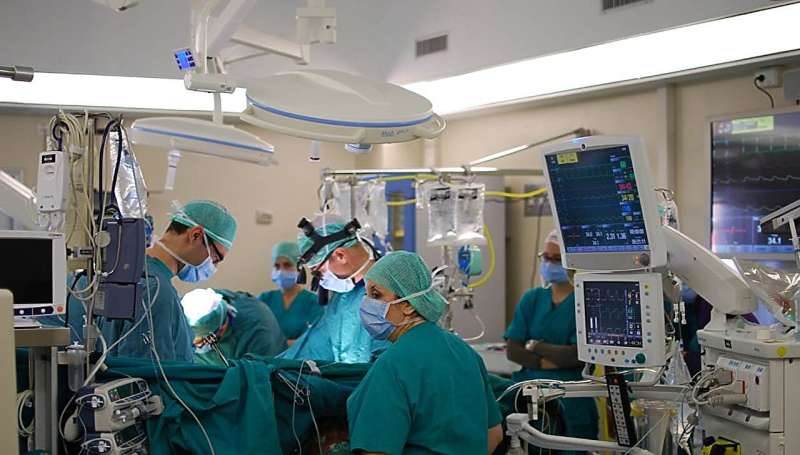This article has been reviewed according to Science X's editorial process and policies. Editors have highlighted the following attributes while ensuring the content's credibility:
fact-checked
peer-reviewed publication
trusted source
proofread
Heart transplant patients from socioeconomically distressed communities face higher mortality, organ failure risk

People from socioeconomically-distressed communities who underwent heart transplantation between 2004 and 2018 faced a 10% greater relative risk of experiencing graft failure and dying within five years compared to people from non-distressed communities.
In addition, following implementation of the 2018 UNOS Heart Allocation policy, transplant recipients between 2018 and 2022 faced an approximately 20% increase in relative risk of dying or experiencing graft failure within three years compared with the pre-policy period. This is despite the fact that the proportion of distressed patients remained the same over both eras.
Significant socioeconomic disparities persist within the U.S. health care system. While previous studies have demonstrated the influence of structural deprivation on cardiovascular health, the impact of community distress on survival following heart transplantation has not been explored.
In a study, published in the Annals of Surgery, researchers relied on 2004–2022 data from the Organ Procurement and Transplantation Network (OPTN) to ascertain the number of adult heart transplant patients, and the Distressed Communities Index (DCI), which uses neighborhood factors such as unemployment, poverty level, median income and housing vacancies to measure community socioeconomic inequity. Of 36,777 heart transplant patients, 7,450 were from distressed communities.
Study limitations include a lack of granular data such as laboratory values and operative times, unavailability of patient medication adherence for analysis, and an inability to identify transplant centers' location or proximity to socioeconomically distressed communities.
Structural community distress is linked with inferior survival following heart transplantation, with the disparity gap in outcomes widening since the 2018 Policy Change. Novel structural and systemic interventions addressing social determinants of health are needed to improve follow-up care and outcomes for vulnerable populations.
Further, the DCI should be integrated into risk-stratification models to prevent risk-averse transplantation strategies that would disproportionately affect under-served patients. Given compounding ramifications from the COVID-19 pandemic, particularly on already vulnerable populations, the field of heart transplantation must directly confront expanding inequity in outcomes.
"While social determinants of health have long been recognized to both shape access to and outcomes following heart transplantation, lack of clear metrics to measure such inequity have limited the development of targeted interventions," said Sara Sakowitz, a medical student at the David Geffen School of Medicine at UCLA who led the study.
"Our work demonstrates community-level socioeconomic distress is linked with inferior survival following heart transplantation, and further establishes this socioeconomic disparity gap is widening. Changes in policy are needed to address persistent inequities in access to health."
Additional study authors are Dr. Syed Shahyan Bakhtiyar, Dr. Saad Mallick, Joanna Curry, Dr. Nameer Ascandar, and Dr. Peyman Benharash of UCLA. Bakhtiyar also has an appointment at the University of Colorado.
More information: Sara Sakowitz et al, Impact of Community Socioeconomic Distress on Survival Following Heart Transplantation, Annals of Surgery (2023). DOI: 10.1097/SLA.0000000000006088



















